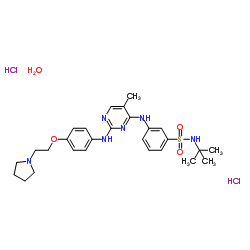1374744-69-0
| Name | UH9J2HBQWJ |
|---|---|
| Synonyms |
Benzenesulfonamide, N-(1,1-dimethylethyl)-3-[[5-methyl-2-[[4-[2-(1-pyrrolidinyl)ethoxy]phenyl]amino]-4-pyrimidinyl]amino]-, hydrochloride, hydrate (1:2:1)
N-(2-Methyl-2-propanyl)-3-{[5-methyl-2-({4-[2-(1-pyrrolidinyl)ethoxy]phenyl}amino)-4-pyrimidinyl]amino}benzenesulfonamide dihydrochloride hydrate UH9J2HBQWJ |
| Description | Fedratinib hydrochloride hydrate (TG-101348 hydrochloride hydrate) is a potent, selective, ATP-competitive and orally active JAK2 inhibitor with IC50s of 3 nM for both JAK2 and JAK2V617F kinase. Fedratinib hydrochloride hydrate shows 35- and 334-fold selectivity over JAK1 and JAK3, respectively. Fedratinib hydrochloride hydrate induces cancer cell apoptosis and has the potential for myeloproliferative disorders research[1][2]. |
|---|---|
| Related Catalog | |
| Target |
JAK2:3 nM (IC50) JAK2(V617F):3 nM (IC50) Flt3:15 nM (IC50) Ret:48 nM (IC50) |
| In Vitro | Fedratinib (TG101348) inhibits proliferation of a human erythroblast leukemia (HEL) cell line that harbors the JAK2V617F mutation, as well as a murine pro-B cell line expressing human JAK2V617F (Ba/F3 JAK2V617F), with an IC50 value of approximately 300 nM for either line. Proliferation of parental Ba/F3 cells was inhibited to a comparable level, with an IC50 value of ∼420 nM[1]. Exposure of these cells to Fedratinib (TG101348) (0.1 μM, 0.3 μM, 1 μM, 3 μM, and 10 μM) reduces STAT5 phosphorylation at concentrations that parallel the concentrations required to inhibit cell proliferation[1]. Fedratinib (TG101348) (0.1 μM, 0.3 μM, 1 μM, 3 μM, and 10 μM) induces apoptosis in both HEL and Ba/F3 JAK2V617F cells in a dose-dependent manner[1]. |
| In Vivo | Fedratinib (TG101348; 60-120 mg/kg; oral gavage; twice daily; for 42 days; C57Bl/6 mice) trewatment shows a dose-dependent reduction in polycythemia and a marked dose-dependent reduction in splenomegaly of treated animals[1]. Animal Model: C57Bl/6 mice induced by the JAK2V617F mutation[1] Dosage: 60 mg/kg, 120 mg/kg Administration: Oral gavage; twice daily; for 42 days Result: Showed a statistically significant reduction in hematocrit and leukocyte count, a dose-dependent reduction/elimination of extramedullary hematopoiesis. |
| References |
| Molecular Formula | C27H40Cl2N6O4S |
|---|---|
| Molecular Weight | 615.615 |
| Exact Mass | 614.220886 |
